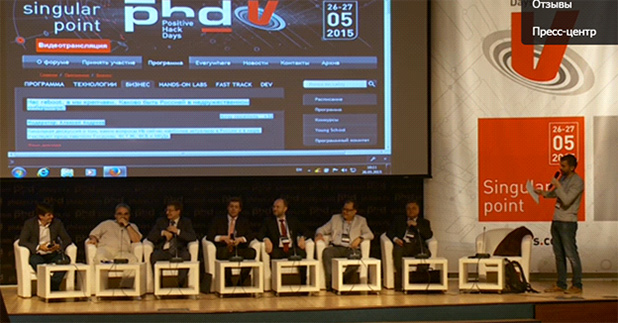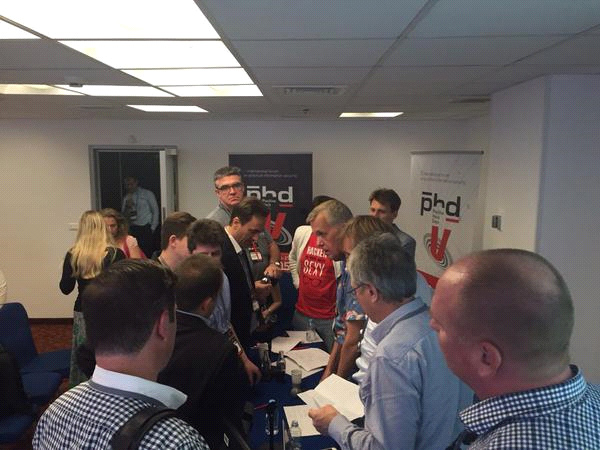PHDays V. Day One: How to Intercept SMS and Hack Satellite
5/29/2015
Positive Hack Days launched on May 26, and on the very first day, cybersecurity experts demonstrated various techniques that are used to hack ATMs, online banking systems, mobile carriers' networks, energy, transport, and industrial companies. More than 50 reports were presented at the Word Trade Center. A number of hands-on labs, round tables were held as well. The organizer provided several video streams to broadcast the most interesting events on the forum's website.
Damage caused by a cyberattack can be measured in billions of dollars, while its actual cost is rather low. According to the Positive Research center, anyone with less than 10,000 dollars is able to gain remote access to somebody else's SIM card, which means access to the subscriber's traffic, SMS, calls and location data. Twenty percent of SIM cards are vulnerable to such attacks. It is also possible to obtain a subscriber's confidential information by attacking his mobile carrier's equipment. An attack on a GSM cell can cost about 1,000 dollars. To hack a base station, an intruder might need only a PC and access to the SS7 network.
Banking systems keep pace with the telecommunications sector. An ATM can hold 10 million rubles. And when it comes to hacking the cash machine, you might only need a Raspberry Pi for $60. Last year, Russia took second place in the world (after Palestine) for the quantity of ATMs that can be detected by special search engines and remotely reprogrammed by using insecure protocols and exploiting numerous vulnerabilities in Windows XP. The situation with e-money is not much better. In 2014, 70% of Android applications and 50% iOS apps contained vulnerabilities that gave access to an e-money account.
Devices that seem harmless at first sight, such as wireless USB modems, can also constitute a danger to users. Mobile operating system developers are slick at fixing vulnerabilities, while modem firmware developers haven't paid much attention to security until recently. According to Positive Technologies researchers, 27 out of 30 firmwares contained critical vulnerabilities. Timur Yunusov presented a report, which reveals how easy it is for an intruder to enable automatic identification and infection of 4G modems in order to intercept traffic, manipulate an account and SMS, break into a computer connected to such a modem.
The philosophical conception of PHDays V involved certain elements of cosmological theories. However, practical aspects were as well in the range of interest, which is why the forum's organizer held the session named Amateur Radio for Space Communication. Speakers discussed information security of space stations; in particular, they discussed the Fobos-Grunt crash considering a version based on external influence. The radio amateur Dmitry Pashkov claims that it is quite possible to jam signals between a control center and a spacecraft. You will find the necessary equipment in any electronics store. Except for an antenna— you'll have to make it by yourself. By using homemade devices, Dmitry managed to obtain solar eclipse images from Meteor-M No. 2 (a Roscosmos satellite) and to get the most up-to-date weather forecast.
How to Protect
A more effective fight against vulnerabilities in information systems and measures for protection of national interests have been discussed at the most "governmental" section — Today's Russia in Unfriendly Cyberworld.
Dmitry Finogenov (FSB department #8), Alexander Radovitsky (RF Ministry of Foreign Affairs), Alexander Baranov (Federal Tax Service), Vadim Dengin, Andrey Tumanov, and Ilya Kostunov (deputies of the State Duma) took part in the discussion. Alexey Andreev (Positive Technologies) and Alexey Lukatsky (Cisco) were speaking on the part of the expert community.
The government officials promised that a new Russian IS concept would have been published by the end of 2015. Vadim Dengin urged Russian Internet users (over 70 million people at the moment) to always be responsible for their words (in court as well) and said, that the security of citizens, data privacy in particular, was the task #1 for the government; therefore, the federal law on data processing center (DPC) transfer to the Russian territory won't be postponed. "The international business totally agrees with that," he said. Vadim's colleague Ilya Kostunov had recently revealed that Google Analytics was installed in all the Russian governmental bodies. Thus, he made an inquiry to the Prosecutor General's Office and Ministry of Economic Development. Ilya mentioned that Russia had had an opportunity to launch its own payment system with chip cards back in 2000.

When securing data in large companies with extensive infrastructures, they say, "A chain is only as strong as its weakest link". Natalya Kukanova from Yandex mentioned in her report — Pig in a Poke: M&A Security Issues — that Yandex deducts the cost of vulnerability elimination from the profit when acquiring third-party projects.
Not only can a large business have growth problems. There are several events traditionally held at PHDays on supporting and promoting IS ideas and solutions. Almaz Capital, a venture capital fund that was represented by managing partner Alexander Galitsky and general partner Geoffrey Baehr, organized an open contest among startups in IS. Moreover, Geoffrey Baehr told about 18 IS startups fighting for 1.5 million rubles and gave some advice to the founders of the new companies.

Photo @AlmazCapital
The PHDays V organizers held a round-table discussion on making an international community of "white hats". Among the participants were the organizers of the top hacker conferences — CanSecWest (Canada), Vangelis and Power of Community (Korea), H2HC (Brazil), CodeBlue (Japan), Chaos Communication Congress (Germany), ZeroNights and PHDays (Russia).
The first day ended with reading the best short stories out of 200 works sent for the Hacked Future contest. Bruce Sterling, the father of cyberpunk fiction, had made the decision on the final standings, and then the MDS team read out the stories about cybernetic Trojans, devourers and head controllers to the forum participants.
The winners of the Hacked Future contest:
I place — Pavel Gubarev ("Uncle Zhenya")
II place — Alexander Matukhin ("Prestige")
III place — Dmitry Bogutsky ("Casting Dice")
IV place was shared between Mikhail Savelichev ("Sixty Deaths of Axis Maria"), Nikolay Murzin and Timur Denisov under the pseudonym "Rumit Kin" ("The Numb Man"), and Juliana Lebedinskaya ("Shadow and Eliza").
You can keep track of the second day of Positive Hack Days V live and on twitter under the hashtag #phdays.